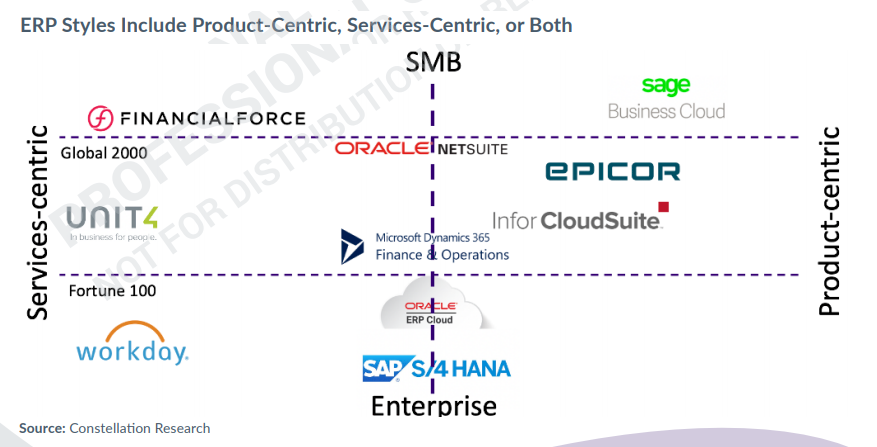
What Will the "ERP Renaissance" Deliver for Your Enterprise?
How will tomorrow's ERP systems transform your business? A new report by Constellation Research hails an "ERP renaissance" and believes customers are seeing the greatest level of innovation in a decade. Its findings are intriguing.
Following conversations with more than 300 technology leaders over the past six months, Constellation Research has its finger on the pulse of ERP development. And the direction of travel seems clear from the title of the report: "Cloud ERP Drives Back-Office Digital Transformation — Vendors Move Toward Self-Driving and Autonomous ERP."
In essence, new cloud deployments provide a catalyst for improving and automating back-office processes like never before, believes R "Ray" Wang, Principal Analyst and Founder at Constellation Research. What's more, services-based ERP systems are at the forefront of change and the use of artificial intelligence (AI) in the back office will power the next wave of post-digital advances.
Another key takeaway from the report is the shift it identifies from product-centric to people-centric requirements, as organizations strive to humanize their digital processes. In fact, Constellation Research highlights Unit4's strength as a services-centric ERP provider within equal reach of Global 2000 and Fortune 100 enterprises (see image).

Doubling Down on Reinvestment
The report's arrival is timely. For many organizations, the COVID-19 pandemic exposed weaknesses in back-office systems. Suddenly, the need for easy access to data, self-service, and automated processes became overwhelming.
So perhaps it's no surprise that an ERP boom seems to be under-way. The study reveals that the global cloud ERP market now enjoys compound annual growth of 11.2 percent and is set to be worth $44.6 billion by 2026.
Furthermore, it notes that an "ERP renaissance" is occurring as vendors double down on reinvestment and users adapt their ERP to a barrage of changing business models and increasing regulation.
As the market grows, trends are appearing too — and the report has been quick to identify them. These include digital monetization models, collapsing value chains, the stability of vendors, and flexible pricing
Five other trends, in particular, catch the eye.
- Regulatory relief as a service: Companies have found that cloud ERP solutions mitigate compliance risk as well as ensure timely implementation of key regulations. What's more, AI is proving useful in fraud prevention and augmenting human decisions.
- Journey orchestration: Enterprises expect to design, execute, and automate end-to-end business processes with the ability to craft cross-functional capabilities.
- Autonomous enterprises and AI: Systems that mimic three senses — sight, hearing, and touch — have entered the mainstream. And large quantities of unstructured data can be ingested and organized.
- Shifts to micro-verticalization and platform ecosystems: Companies expect their cloud-based ERP solution to deliver on deep industry-vertical functionality.
- Cloud ERP platforms: ERP vendors will open their platform layers to enable user-based configuration to accommodate changing business models and new requirements.
Challenges for Buyers
Constellation Research also notes particular challenges for buyers who are stepping away from legacy ERP systems that have outlived their useful life.
Improved analytics, reporting, and forecasting have become key. In fact, "a growing number of organizations seek improved forecasting, planning, and scenario-building tools powered by some level of AI."
Companies also want industry functionality and deeper out-of-the-box capabilities for configuring platforms to deliver on unique business requirements. Being able to handle every "new whim of government" — when it comes to regulation and compliance — is another area where organizations expect answers from their ERP system.
But perhaps one of the most interesting challenges for buyers is finding an ERP that reflects a shift away from product-centric to people-centric requirements.
The report states: "Over the past decade, customers have been seeking ERP systems that also address the services-centric requirements and people-centric approach to humanizing digital processes. From post-market installation to project management, services delivery, and warranty management, people-centric processes have blended with the product-centric world and in many cases spawned people-centric-only businesses."
And it's this services-centric approach that sees Unit4 being singled out in the study (see image). The report also comments that "customers tend to select Unit4 ERP for its deep vertical expertise, mid-market focus, and people-centered design philosophy."
The report highlights Unit4's capabilities, revenues of $480 million, and the fact that it offers the full suite of services-centric ERP offerings. These include an ERP suite for financial management; human resources and payroll; planning, budgeting, and forecasting; procurement management; project management; and enterprise asset management services-centric offerings.
It also highlights Unit4's key industries as professional services, education, public services, not-for-profit, real estate, wholesale, and financial services.
But perhaps the most exciting reference is the focus on ERPx, Unit4's newest solution and its breakthrough capabilities. The report notes: "The latest release, Unit4 ERPx, focuses on the Unit4 business and emphasizes the People Platform, a micro-services-based SaaS architecture, and release themes around self-driving ERP. This ML-driven approach will focus on anomaly detection, fraud detection, and smart invoicing."
Automated Approval Workflows
While the report only gives readers a taste of ERPx, the reality is that this next-generation solution from Unit4 directly speaks to so many of its key themes.
ERPx makes it easier for companies to remain secure and compliant while continually adapting. They can create tailored and automated approval workflows to increase productivity and ensure organizational compliance. Governance can be maintained within one easy workflow.
In the meantime, organizations can respond better to opportunities, plan and adapt to market disruption and increase resilience. They can foresee and pivot against market pressures faster than competitors, using an agile and adaptable cloud ERP platform. Tailored service industry functionality and flexible accounting capabilities will enable them to adapt to specific market changes.
Automation accelerates so many areas in ERPx. Companies can manage increasing complexity by optimizing and automating processes to deliver improved insights, ease admin work, and provide the ability for growth. They can utilize hyper-automation to ensure data is always processed efficiently with minimum manual input. They can create leaner ways of working using AI and digital assistants.
AI-powered tools are also fundamental to managing vast amounts of data to enable outstanding planning, forecasting and reporting. AI-supported forecasting and analytics can be used to manage complex financial models by streamlining the analysis and budget planning process.
Redefining Processes
The report ends with a specific focus on the cloud, suggesting that users will seek pragmatic strategies for cloud migration. And it notes that migration to a new ERP system presents an opportunity to improve and even redefine existing processes.
And it's here again that ERPx will inspire finance, HR and planning teams that need to adapt quickly and grow revenues without needing to increase staffing. With Unit4, they can leverage an agile and adaptable cloud ERP platform for fast implementation and continuous access to new features to improve processes and analytics.
Discover more
When it comes to accelerating back-office transformation, creating self-driving systems, and enabling autonomous ERP, the right platform and stand-out products are within reach today from Unit4.
Discover how our solutions are unique in how they help you to plan, manage and optimize complex resources through one seamless and responsive People Experience. You don't need to wait as the ERP market evolves any further — because the best tools are already available today. The ERP renaissance has begun.





